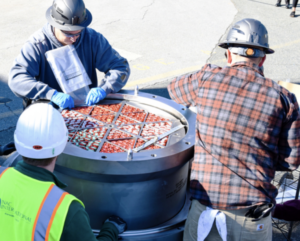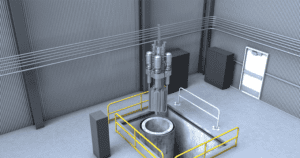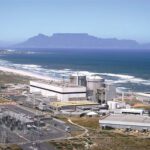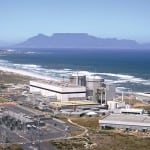South Africa, reeling from a power crisis caused by a lack of generating capacity, on Friday canceled a plan to build a nuclear plant for about $12 billion, saying it was “not in a position to invest in nuclear.”
Eskom Holdings Ltd., the state-owned utility that produces 95% of the country’s power and which has been under fire for rolling blackouts earlier this year, had been counting on the new nuclear station to expand its generating capacity by 20,000 MW by 2020.
South Africa’s power demand has rocketed 50% since the apartheid era ended in 1994. But until 2004, government indecision had postponed construction of new capacity. In January this year, as its reserve margin dropped to 8%, Eskom was forced to conduct widespread load shedding, cutting crucial electricity supplies in the country that is home to some of the largest gold and platinum mining companies in the world.
To secure its future power supplies, Eskom has embarked on a massive $33.6 billion infrastructure expansion program. The utility’s ultimate goal was to deliver an additional 16,304 MW in generation capacity by 2017, with this figure doubling to about 80,000 MW by 2026. Bloomberg reported earlier last week that negotiations with the World Bank for a loan of as much as $5 billion to fund that expansion were at an “advanced stage.” But with the South African rand declining 24% against the dollar over the past six months, and the government’s reluctance to raise power prices 61% per Eskom’s recommendation, the utility’s credit rating has been slashed. This has made it challenging for Eskom to acquire required funding.
Eskom said Friday that it had been decided not to proceed with the proposed Nuclear-1 project—which would have been the country’s second pressurized water reactor after the existing 1,930-MW Koeberg power station in the Western Cape region—“due to the magnitude of the investment.”
But that decision would not undermine the “national security of supply,” said the South African Department of Public Enterprises, Eskom’s official overseer. The agency noted that the global recession and rising interest rates in South Africa had reduced government economic growth projections. For that reason—and with Eskom continuing other planned new builds—it was “comfortable” with Eskom’s decision to cancel Nuclear-1.
“Particularly in the context of the global financial crisis, we must be vigilant to ensure that Eskom does not over-extend its balance sheet and that our ability to provide the economy with competitively priced energy is not jeopardized,” said Vimla Maistry, the government’s chief communications official.
The government also said that the cancellation would not affect Eskom’s construction plans for other mega-plants, such as the coal-fired 4,788-MW Medupi and 4,800-MW Kusile plants. Nor would it end Eskom’s ambitions to build nuclear power in South Africa.
“As a means of diversifying our energy base-load from an overwhelming reliance on coal, to stablise the grid and to reduce our carbon footprint, government is committed to exploring the use of nuclear energy as part of base-load energy generation and to build an associated industrial capability to support such generation thereby reducing the cost of nuclear energy over time. This is in accordance with the National Nuclear Policy,” the government said.
Eskom said that as a result of its decision it had terminated the commercial procurement process to select the preferred bidder for construction of the project. The utility also informed the two vying bidders—the EPR consortium led by France’s AREVA and the N-Powerment consortium led by Westinghouse—of its decision.
AREVA had proposed two 1,650-MW reactors, while Westinghouse offered to build three 1,140-MW reactors. South Africa’s construction groups Aveng Ltd. and Murray & Roberts Ltd. had also bid for the contract.
“The Board has expressed its appreciation to the two bidders for their interest in the Eskom build programme, and in particular their desire to participate in the nuclear industry in South Africa,” said Jacob Maroga, Eskom’s CEO. “We were impressed by their professionalism throughout the bid process. We thank them for their patience and understanding during the past few months.”
Sources: Eskom, South Africa Department of Public Enterprises, Bloomberg, POWER magazine, powermag.com








